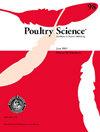芳香化酶抑制剂可以通过上调与类固醇激素合成有关的基因来改善老年公鸡的精液质量。
IF 3.8
1区 农林科学
Q1 AGRICULTURE, DAIRY & ANIMAL SCIENCE
引用次数: 0
摘要
芳香化酶过高会降低老龄公鸡的繁殖性能。芳香化酶抑制剂(AI)可以抑制芳香化酶的活性,改善高龄公鸡的精液质量。然而,相关的分子机制仍不清楚。本研究的目的是通过转录组和蛋白质组测序,探讨AI来曲唑改善老年公鸡精液质量的调控机制。在本研究中,56周龄的公鸡被饲养在单独的笼子里,以标准基础日粮和口服来曲唑42天(D),日剂量为0.25 mg/kg。在来曲唑用药前(0 D)和用药后(42 D)测量精液质量和血清激素。分别检测了活性氧(ROS)和线粒体膜电位(MMP)。结果表明,来曲唑治疗组(LET)的精液量、精子活力、精子密度、MMP、睾酮(T)和促性腺激素释放激素(GnRH)均显著高于对照组(CN)(P2),而来曲唑治疗组(LET)的ROS显著低于对照组(CN)(P3)。本文章由计算机程序翻译,如有差异,请以英文原文为准。
Aromatase inhibitors can improve the semen quality of aged roosters by up regulating genes related to steroid hormone synthesis
Excessive aromatase can reduce reproductive performance in aged roosters. Aromatase inhibitors (AI) can inhibit the aromatase activity and improve the semen quality of aged roosters. However, relevant molecular mechanism is still unclear. The purpose of this study was to explore the regulatory mechanism of AI letrozole improving semen quality in aged roosters by transcriptomic and proteomic sequencing. In this study, 56-week-old roosters were reared in separate cages on a standard basice diet and oral letrozole 42 days (D) at a daily dose 0.25 mg/kg. Semen quality and serum hormone were measured before (0 D) and after (42 D) letrozole administration. Reactive oxygen species (ROS) and mitochondrial membrane potential (MMP) were detected, respectively. The results indicated that semen volume, sperm motility, sperm density, MMP, testosterone (T) and gonadotropin releasing hormone (GnRH) in letrozole treatment group (LET) were significantly increased than those in control group (CN) (P<0.05); estradiol (E2) and ROS in LET were significantly lower than those in CN (P<0.05). Through transcriptomic and proteomic analysis, we identified 189 differently expressed genes (DEGs) and 64 differentially expressed proteins (DEPs) in the comparison of LET and CN. DEGs and DEPs Gene Ontology (GO) and Kyoto Encyclopedia of Genes and Genomes (KEGG) items are mainly enriched in steroid biosynthetic process, cell differentiation and proliferation, lipid metabolic process, oxidation-reduction process and electron transfer activity. Furthermore, 8 genes including STAR, CYP17A1, NSDHL, SULT1E1, EHF, NRNPA1, PLIN2 and SDHA were identified as key genes for letrozole to regulate semen quality in aged roosters. These results indicate that letrozole can up-regulate the expression of genes related to steroid hormone synthesis, cell differentiation and proliferation, electron transfer activity, and enhance mitochondrial activity, increase testicular weight, and ultimately improve the semen quality of aged roosters.
求助全文
通过发布文献求助,成功后即可免费获取论文全文。
去求助
来源期刊

Poultry Science
农林科学-奶制品与动物科学
CiteScore
7.60
自引率
15.90%
发文量
0
审稿时长
94 days
期刊介绍:
First self-published in 1921, Poultry Science is an internationally renowned monthly journal, known as the authoritative source for a broad range of poultry information and high-caliber research. The journal plays a pivotal role in the dissemination of preeminent poultry-related knowledge across all disciplines. As of January 2020, Poultry Science will become an Open Access journal with no subscription charges, meaning authors who publish here can make their research immediately, permanently, and freely accessible worldwide while retaining copyright to their work. Papers submitted for publication after October 1, 2019 will be published as Open Access papers.
An international journal, Poultry Science publishes original papers, research notes, symposium papers, and reviews of basic science as applied to poultry. This authoritative source of poultry information is consistently ranked by ISI Impact Factor as one of the top 10 agriculture, dairy and animal science journals to deliver high-caliber research. Currently it is the highest-ranked (by Impact Factor and Eigenfactor) journal dedicated to publishing poultry research. Subject areas include breeding, genetics, education, production, management, environment, health, behavior, welfare, immunology, molecular biology, metabolism, nutrition, physiology, reproduction, processing, and products.
 求助内容:
求助内容: 应助结果提醒方式:
应助结果提醒方式:


